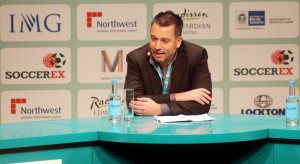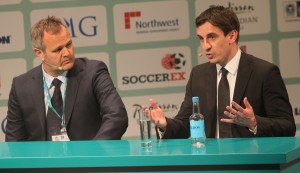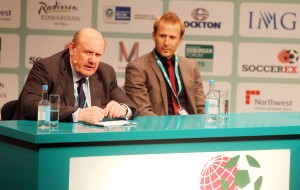Soccerex European Forum – Manchester (March 2012): For Better or Worse – Football and The Media
Day 2 – Thursday 29 March 2012
14:00 – 15:00 For Better or Worse – Football and The Media
- Guillem Balague (Sky Sports football expert) [Moderator]
- Gaizka Mendieta (Sky Sports and Former Spanish International)
- Gary Neville (Sky Sports and Former England International)
- Brian Barwck (Founding Partner, Barwick Media & Sport)
- Paul Hayward (Chief Sports Writer, Daily Telegraph)

Guillem Balague (Sky Sports football expert)
Guillem Balague started this session by asking Gary Neville how he saw the relationship between players and the media. Neville said that it had not always been great. Players have certain journalists they trust, but footballers are emotional creatures and can react accordingly. He added that he believed that Twitter had brought players closer to journalists. Paul Hayward said that it was often a troubled relationship but it was mutually dependent and journalists have to be accountable. Gaizka Mendieta agreed that both groups need each other. Brian Barwick said the relationship was a bit of a ‘glass palace’. At the end of the day, football needed the media and vice versa, with money the driving force. The relationship has to work and Barwick believes that the day-to-day dealings have to be better.
The next question was to former players, Gaizka Mendieta and Gary Neville, with Guillem Balague asking that if they could implement one thing to improve the relationship with the media, what would it be. Gary Neville stated that if the older players had a cynical relationship with the media, this invariable filtered down to the young players and the rest of the changing room. He suggested that perhaps that in the case of the England team, it would be beneficial for the press to travel with them. Neville reiterated his earlier point about the interaction that Twitter provided. With the mistrust that existed with journalists, media events were currently very controlled. Gaizka Mendieta said that if the press and players were closer, even friendlier, then perhaps journalists would find it more difficult to criticise players. Brian Barwick picked up on Gary Neville’s point about the press travelling with the England team. He said that back in the 1990’s the media did indeed travel with the team, however back then there would only be a group of 20 or so journalists. Today that figure would be nearer 120, so would not be realistic to accommodate all that number. Barwick stated that the interview process needs to be streamlined. Gary Neville agreed and said that at Manchester United they had a full range of internal commitments (MUTV, radio, matchday programme, club magazine and sponsors) and believed there were too many and bordered on being a distraction.
In Spain, Guillem Balague said there was a model of circles with football at the centre, and going outward with groups such as players and fans. At the very outside was the media. Gary Neville said that was the right position, but acknowledged the influence of the media. Brian Barwick said that the media should be intrusive when it needed to be, but things had changed, with the fans having a greater voice through the internet. Neville was in agreement and said this had a significant impact on the newspapers, in that with the internet (for instance Twitter); a story could break, be resolved and disappear before papers are published the next day. Gaizka Mendieta believed that Twitter was important in that it gave fans an insight into what goes on the dressing rooms and a glimpse of the life players had outside of the game.

Given this pressure on the written media, Paul Hayward was asked what the future for papers was. He detailed that newspaper circulation was declining 6-8% a year. Papers had embraced websites and Twitter. Indeed, Twitter now generated copy, but did allow players to cut-out journalists. Hayward accepted that with the advent of blogs, anyone (irrespective of knowledge or experience) could be a ‘journalist’. Gary Neville said that for him with Twitter it was a case of ‘if you can’t beat them, join them’. The speed and amount of information was incredible and it was something that isn’t going to go away. He believed that in future, there would be football regulated Twitter that would be commercialised by clubs.
The next question looked at players going into the media once they had retired. Brian Barwick said that the opportunities had always been there and during his time at the BBC, gave Gary Lineker, Alan Hansen and Mark Lawrenson their starts in television. Gary Neville added that footballers weren’t the brightest bunch so that limited future employment after their playing days. He added that many players ask him about what it is like retiring and how to make the transition into the media. Neville said that players couldn’t spend their footballing career being off-hand and uncooperative with the press and then expect to walk into the business. The media had to be embraced as if ignored, they could do serious damage to any career.
Guillem Balague asked about the media and national teams. Brian Barwick said that it was quite simply a ‘big event’. Gary Neville said that he was surprised by the scale of the media attention and that was coming from the background of Manchester United press events, which were themselves major sessions. However, at club level, he added that players were much more protected. Paul Hayward felt that anything to do with England was significantly more emotional and to some extent distorted, with a vicious circle of hype and speculation feed by the public and the media. Balague asked though if this was the same for all national teams. Gaizka Mendieta said that when Spain became World Champions, the media was in the dressing room celebrating too, as the team would have been working and dealing with the journalists almost as ‘friends’ and therefore shared in the triumph. Brian Barwick believed that the media was much more critical of England and were always looking for a way in to get a story, which was more difficult at club level as they were more together.
Gary Neville briefly touched on the issue of the England job and was critical of The FA. He couldn’t understand why the decision and process was taking so long, given that precious preparation time for the manager and players was being lost.

The panel was asked if the media and players were obsessed with the idea of celebrity and stars. Gary Neville said that from a players perspective that was an individual decision, in that they could choose to keep their heads down out of the spotlight. Paul Hayward said that the media did to some extent pursue the celebrity agenda, but it kept the Premier League in the headlines and promoted the ‘business’. However, he accepted that perhaps there was a market for a more technical and tactical approach. Gaizka Mendieta said certainly in Spain, the media wanted to focus and talk more about tactics. Brian Barwick agreed that the media was celebrity obsessed. This had arisen because more games are seen on television, so that the need for straight reporting had declined. Football had to be brought to life in another way and ‘celebrity’ was one of those ways. Therefore, Barwick believed that players needed more media education. This would not only be better for their careers as players and once they retired, but also improving the relationship (even bringing about some respect), with the media.